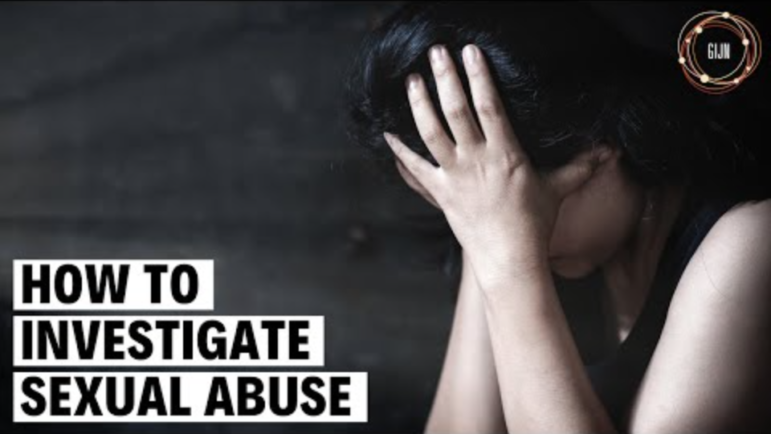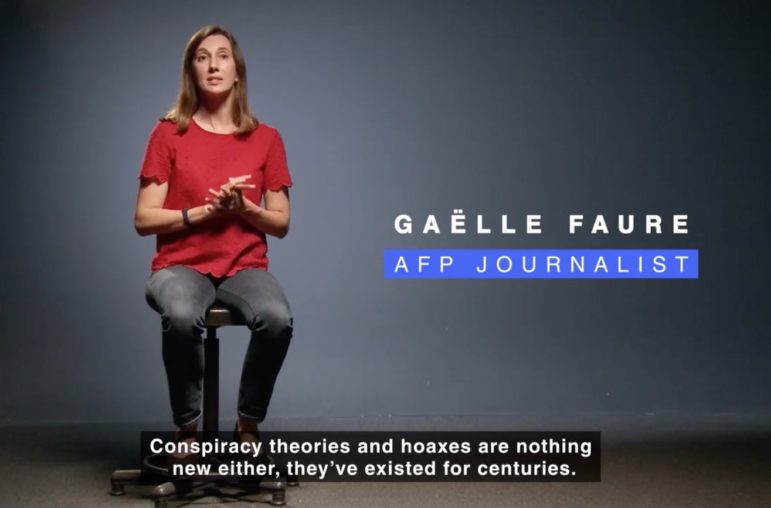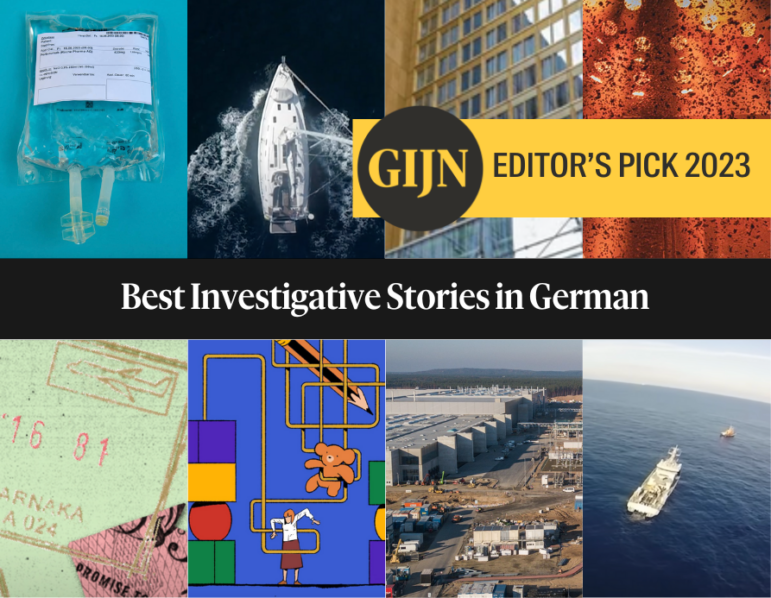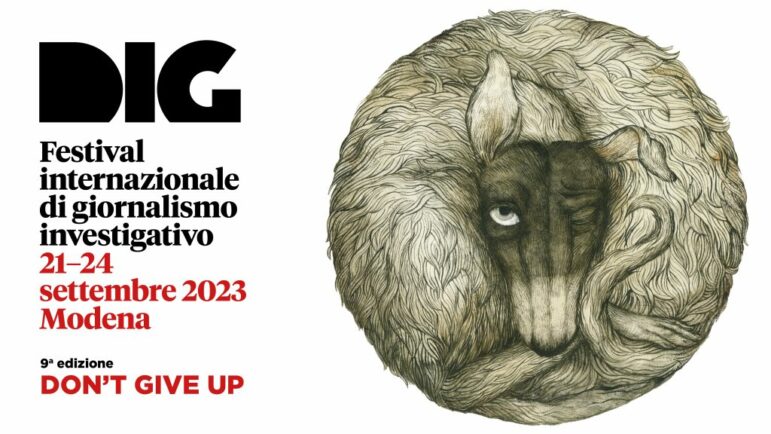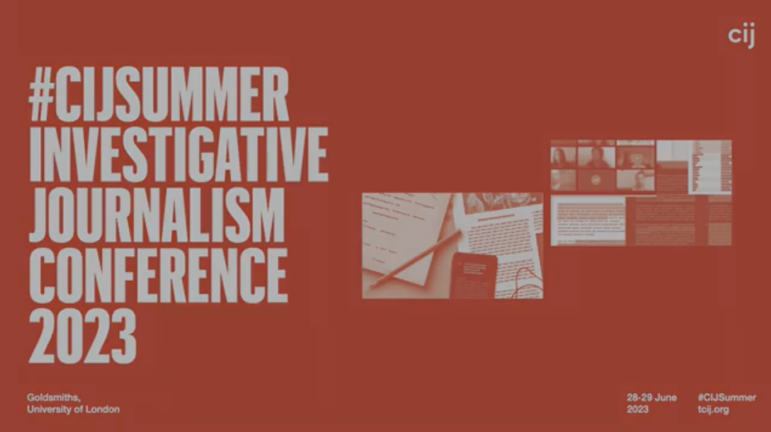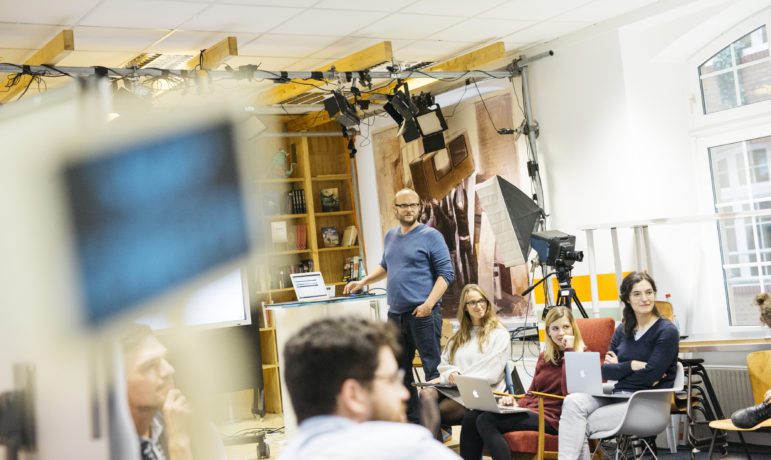

CORRECTIV, Germany’s First Nonprofit Newsroom, Leads With Innovative Journalism
Before David Schraven launched CORRECTIV, Germany’s first nonprofit investigative newsroom, he scribbled in a notebook all of his aspirations for the new media organization. These ideas – some straightforward, others more fanciful – filled 140 pages.
Eight years on, many of his jottings have become a reality. “There is not much left,” Schraven tells GIJN. Today, CORRECTIV boasts an annual budget of about €4 million (US$4.5 million), a staff of 60, and has become one of the world’s largest nonprofit centers for investigative journalism. As Schraven had hoped, CORRECTIV has delivered groundbreaking investigations and trained aspiring journalists, as well as staged plays and exhibitions inspired by current affairs that serve to bridge the gap between art and news.
The news outlet — a member of GIJN since 2014 — has collaborated with major broadcasters and newspapers that include the BBC, NBC, and Le Monde on the CumEx Files. That project documented how lawyers and financiers had employed complex share deals to secure tens of billions of euros in undue tax rebates from European treasuries.
Beyond video documentaries and online reports, CORRECTIV has also published about 30 non-fiction books, including the graphic novel “White Wolves” and a biography of the Turkish President Recep Tayyip Erdoğan, launched an annual journalism festival, and created a crowdsourcing platform that enables citizens to contribute information to large-scale investigations.
Alongside others, CORRECTIV is also lobbying the German parliament to pass a law allowing nonprofit news outlets to be granted charity status, which would permit them to accept donations and avoid corporate taxes, and for their donors to receive tax reductions. (CORRECTIV has been a charity from its founding, in part by virtue of the training courses it offers.) This legislation would encourage the development of like-minded media organizations, Schraven says.
“When CORRECTIV started, there were many doubts: Would such a project have a chance?” Tanjev Schultz, journalism professor at the Johannes Gutenberg University in Mainz, tells GIJN. “It has developed into a success story. It is also an important symbol for the possibilities and the value of nonprofit organizations in journalism.”
Before CORRECTIV, Schraven led the investigative unit of Funke Mediengruppe — which at the time was called WAZ-Gruppe, one of Europe’s largest local news publishers. In that role, he worked across five different daily newspapers, including the flagship Westdeutsche Allgemeine Zeitung. Among other stories, his team of half-a-dozen journalists investigated a European-wide steel cartel, organized crime killings in the Ruhr valley, and alleged corruption in the German Olympic committee.
“We had every freedom we needed,” Schraven says of the support he received from WAZ-Gruppe. “If I wanted to spend money, I spent money.”
But budget cuts following a change of ownership in 2012 convinced him that this state of affairs would not last. In order to maintain his freedom, as well as to expand the range of his activities to include data, video, and more, he decided to launch a non-commercial media organization. As he embarked on that project, he drew inspiration from others, including the US nonprofits ProPublica and the Center for Investigative Reporting. Discussions with Sheila Coronel, of Columbia University’s Graduate School of Journalism, and Gina Chua, now executive editor at Reuters, helped sharpen his design.

Olaya Argüeso Pérez, joint editor-in-chief, speaks to a member of the team. Image: Courtesy of Ivo Mayr / CORRECTIV
In December 2013, he founded CORRECTIV in Essen, a city in the west of the country a few miles from his hometown of Bottrop. CORRECTIV’s headquarters are there, as is its bookshop. It also runs a local, online radio station, operated by some 40 teenagers, in Bottrop. Why launch a journalism start-up in an old mining city many miles from Germany’s main media hubs? “Here there are real-life problems,” Schraven explains. “I thought, and I still think, that it’s very important to stay connected to what people really suffer from: poverty, unemployment, really bad healthcare systems, dying cities, inner-city problems… To stay in a workers’ area is quite important for a journalistic organization, to avoid being disconnected.”
Another incentive for setting up shop in Essen was the presence of the Brost-Stiftung, a nonprofit foundation that proved key to CORRECTIV’s early success. The foundation and Schraven share a WAZ background, as it was created by Anneliese Brost, the late wife of Erich Brost, the founder and first editor-in-chief of the West German newspaper. The foundation, which funds innovative projects in the region, was the news organization’s sole funder in its first year, contributing €675,000 ($750,000). The following five years saw Brost donate a further €3.15 million ($3.5 million), according to CORRECTIV’s disclosures.
Beyond Essen
The news outlet’s reach does, however, extend well beyond the Ruhr valley region where it is headquartered. Its main newsroom is in Berlin, and CORRECTIV’s joint editors in chief, Justus von Daniels and Olaya Argüeso Pérez, are also based in the German capital. While CORRECTIV does run investigations focused on Essen, it reports on national and international affairs as well.
One of its pan-German projects examined the country’s housing market. As the German land registry’s individual entries are only accessible to the accommodation’s occupants, CORRECTIV was not able to independently gather the data it needed. Instead, it crowdsourced data from thousands of tenants throughout the country, using CrowdNewsroom, a platform developed for this purpose. The information collected helped CORRECTIV reveal the existence of anonymous real estate funds systematically avoiding taxes, as well as the ease with which illicit money can enter the real estate market.
Projects like these have helped Schraven build on his vision of creating a newsroom that is as open and collaborative as possible. “You need to get people involved in reporting,” he says, “to help them better understand what journalism is about and what its worth is for society.”
“We do a lot of workshops,” he continues. “Before the coronavirus, we had an annual festival in Düsseldorf with about 10,000 people participating. I know that investigative newsrooms tend to hide themselves, but we are the opposite of that: we don’t have any closed doors. Some of our most important sources, for big stories, just walked in.”
One of CORRECTIV’s major projects was a series of insightful reports about the Transatlantic Trade and Investment Partnership, a proposed trade agreement between the European Union and the United States. “CORRECTIV at that time became a very strong voice pushing for these negotiations to be more visible,” says von Daniels, who led that reporting. He now manages CORRECTIV’s local, national, and crowdsourced coverage, while Argüeso Pérez, who is Spanish, takes the lead on cross-border collaborations.
Among the projects Argüeso Pérez has spearheaded is a follow-up to the CumEx files, which involved 15 media partners in as many countries.
While CORRECTIV is a GIJN member, it has not joined any collaborative reporting networks, such as the International Consortium of Investigative Journalists or European Investigative Collaborations.“ What is important to me is to stay free,” Schraven says. “Our vision is to work with the right partners for the audience we want to reach. If you’re stuck with a fixed network, that might hinder you.”
CORRECTIV has, however, created its own network of local reporters — some 1,100 all across Germany. Schultz calls this collaboration “especially valuable.” “This offers opportunities to strengthen democracy on the local level,” he says.
To reach a broader audience, CORRECTIV has now published some stories in English and one in Spanish. Özgürüz, a self-contained CORRECTIV news desk headed by the exiled Turkish journalist Can Dündar, former editor of Cumhuriyet, provides coverage of Turkey that is free from that country’s censorship. It is available in both Turkish and German.
New Platforms
Meanwhile, CORRECTIV has diversified its sources of income. Schraven says the organization has met its objective of earning about 40% of its revenue from small donors, 30% from big donors and foundations, and the remainder from corporations. Funding from small donors typically involves regular payments: CORRECTIV avoids one-off crowdfunding exercises, which can make for an unstable funding model. As a result, the outlet is able to avoid advertisements and paywalls.
CORRECTIV’s not-for-profit parent organization discloses all donations exceeding €1,000. As of September, the 2021 list of donors features Google (€150,000), Open Society Foundations (€70,000), and Deutsche Telekom (€25,000). The single largest donor is now Luminate, created by eBay founder Pierre Omidyar, which donated roughly 10% of CORRECTIV’s budget in both 2020 and in 2021. Brost, however, is no longer a donor.
CORRECTIV also has a for-profit publishing subsidiary, which releases quarterly and annual reports, but does not break down the exact sources of its income. Facebook, for example, pays CORRECTIV’s for-profit business to fact-check posts on the social media platform, Schraven says. It is not known how much the news outlet has earned from Facebook in this way, and Schraven declines to disclose that information.
Why has CORRECTIV chosen to collaborate with the beleaguered social media company, which has been criticized for profiting off of the spread of inaccurate information? Schraven explains that he wishes to fight, in the German context, the sort of online misinformation that contributed to Donald Trump’s US presidential victory in 2016.
“Trump won in the Rust Belt of America; I live in the Rust Belt of Germany,” he recalls thinking after that election. “I said: ‘We need to do something about it, and the first thing we need to do, immediately, is debunking.’ Facebook were thinking the same way. Facebook is the place where all this happens. If you want to be effective in debunking, you need to do it where the fake news is distributed.”
Some German journalists told GIJN they resent the idea of a rival news outlet rating the accuracy of their work. In practice, Schraven says that CORRECTIV chooses which posts to fact-check, and doesn’t typically vet statements by fellow journalists or newsrooms but instead focuses on misinformation actors online.
Those whose posts are brought into question are, in any case, not always pleased. One target, the former WirtschaftsWoche editor Roland Tichy, successfully sued CORRECTIV over one of its fact-check ratings on Facebook, which a German court of law found to have itself been misleading. CORRECTIV has since corrected the mistake. “If we make a mistake, of course we correct it,” Schraven says.
CORRECTIV’s editorial turnover has also raised eyebrows. Its newsroom has had a number of different editors in just eight years. Schraven was briefly in the role before vacating it to focus on his duties as publisher. Argüeso Pérez, who took the top editing role as a job-share in 2019, says that the amount of energy required to get a start-up off the ground may explain why early editors did not stick around. She adds that the current leadership is in it for the long run.
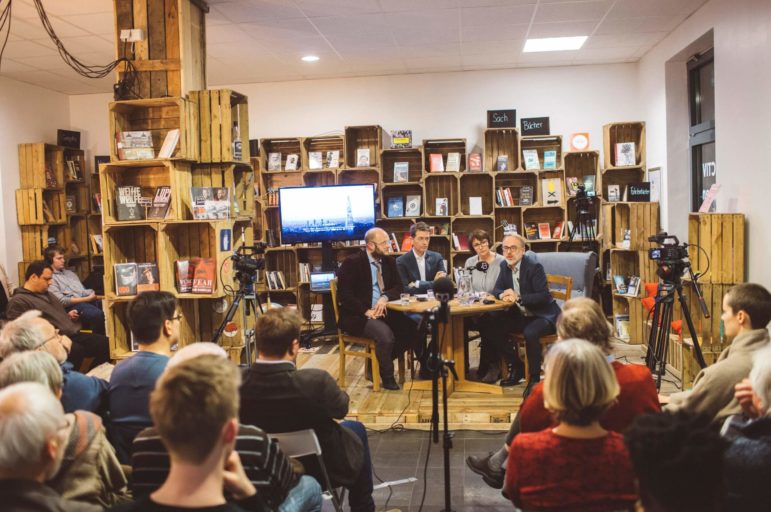
Discussing the CumEx investigation in CORRECTIV’s Essen bookshop. Image: Courtesy of Ivo Mayr / CORRECTIV
What comes next? CORRECTIV’s publishing house is about to release its first three novels. Written by outside journalists who aspire to become novelists, the books address current affairs in a literary manner, Schraven says. “What is at the forefront of my head is how to combine journalism with the force of art,” he explains, adding that CORRECTIV is still figuring out the right balance between its fiction and nonfiction output. But, in defense of journalists’ artistic aspirations, he argues: “From my point of view, it’s important to set the minds of the journalists free, in order to enhance their reporting and their storytelling. If you see more options of what you can do and what you can imagine, then it’s better in the long term for describing the world you’re living in.”
CORRECTIV will, in other words, keep innovating.
Correction: This article initially listed Schraven’s hometown as Essen. It has been updated to accurately reflect that his hometown is Bottrop.
Additional Reading
How Academics, Nonprofit News, and Government are Collaborating
How to Make Your Journalism More ‘Memberful’
CrowdNewsroom: Using Communities to Assemble Non-Public Data Sets
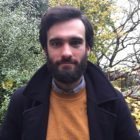 Olivier Holmey is a French-British journalist and translator living in London. His work has appeared in The Times, The Independent, Private Eye, NiemanLab, The Africa Report, and Jeune Afrique, among other publications.
Olivier Holmey is a French-British journalist and translator living in London. His work has appeared in The Times, The Independent, Private Eye, NiemanLab, The Africa Report, and Jeune Afrique, among other publications.

